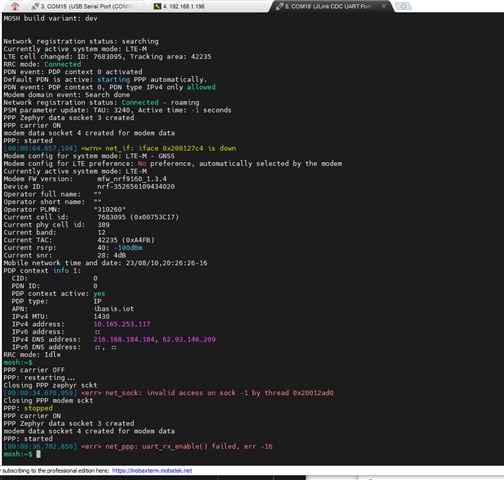I'm trying to connect the nrf9160dk from its uart0 running the modem_shell sample code from SDK v2.2.0 to our Dart6ul on its tty4 uart running at 921600 baud using a PPP connection. I have been able to use the modem_shell on the nrf9160 and ubuntu laptop successfully. But I'm getting errors in both configurations that I don't understand completely. When trying to replace the ubuntu laptop (ttyACM0) with the Dart6UL (ttymxc4), I use the same command (changing the port) to initiate the PPP connection from the unix device:
I have been able to successfully run the Serial LTE Modem example on my 9160 and Dart-6ul with these same devicetree settings to use the ttymxc4 and uart0.
When running the mosh, I see these same errors on the MoSH terminal (regardless of ubuntu or dart-6ul):
And the bottom two repeat. I'm attaching photos of the ubuntu and the dart-6ul outputs from MoSH prompt. In addition the Dart-6ul is not completing the setup of the PPP connection. I see the PPP start but then it fails out and eventually gives me a fork error. I'm attaching my net-connect and net-chat file running on the Dart-6ul. And a log file that the net-connect kicks off.
Any help getting these understood and me pointed in the right direction would be greatly appreciated!
9160dk_mosh_errors.jpg shows the startup of the LTE connection and the issues identified above.
dart_6ul_fail1.jpg shows that the PPP did initiate but it doesn't appear as a network interface and then displays the fork error.




